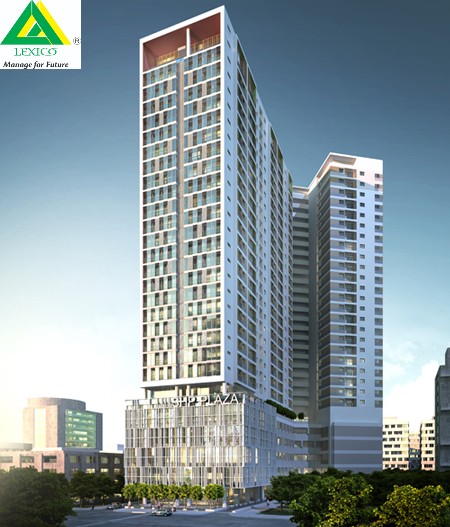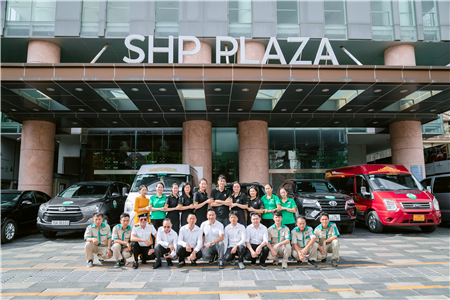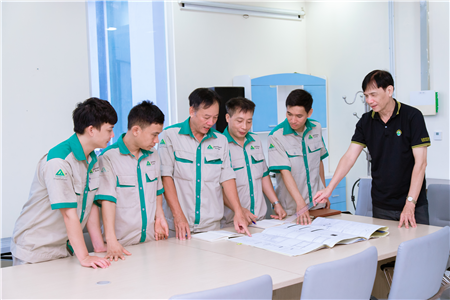Conflicts between residents and the management of apartment buildings in our country are getting more and more complicated, although our regulations have come close to that of developed countries where this model operates effectively.
The cause of this seemingly simple problem is that: (i) The role and operation of the Boards of Directors is not properly understood; (ii) residents often participate sporadically, at the expense of the Management Board, but demand high-quality shared services with low contributions; and (iii) in many cases, the people participating in the management board said they were volunteering, without taking money, but then mixed with the general budget.
Common services that all residents need include: Security, cleaning, landscaping, shared spaces, maintenance and repairs as needed. The residents elect and entrust the management board to take care of the general affairs. The apartment management board is, in fact, a simple "state management model" with all its basic features and functions with accompanying organic problems.
There are two key issues:
Identify general services to be provided with quality and price;
Select people for the Governing Body along with incentive and monitoring mechanisms.
Smoldering conflicts with the Investor… about private common property
For the first problem, routine services such as: Security, cleaning and daily garbage collection are often simple, easy to determine the costs and find the provider. These costs are the same as recurrent expenditures with state norms, so they are less controversial.
In contrast, large or unexpected expenses such as major repairs or unexpected breakdowns are often difficult to determine quality and cost. They are like public investment of the state, large-scale, prone to generating negative effects. In addition, the way the general maintenance fund is used can also be obscure and difficult to control.
For the election of the Board of Directors, according to current regulations, it can be according to the cooperative model (each household in the building gets an equal vote or is counted according to the m2 used as one vote) or according to the corporate model. share. Most of the current apartment management boards in Vietnam follow the democratic model, that is, one vote per household or one vote per m2 used. For it to function effectively, its inhabitants need to master democratic principles associated with incentives and incentives for individuals to participate.
The first is to explicitly specify that board members should be compensated for their time. The spirit of service is just a supplement, the main thing must be adequate remuneration. This will create a competition to be able to choose the best people for the job and it will be easier to monitor the activities, avoiding the situation of volunteering to cover up other things, especially the work. use the general budget (building operation fee and building maintenance fund).
The organization and operation of the board of directors in association with authority and responsibility must be clearly established. Candidates must have an action plan or campaign platform to explain to the whole community. If there are not many people interested in joining the Board of Directors, incentives or remuneration are not adequate and need to be adjusted.
The next problem is the monitoring mechanism with the substantive participation of the majority of residents. If the selection and monitoring mechanisms are not reasonable, those who hold the general budget will use them to their personal benefit. Corruption, eating less is inevitable.
The current regulations in our country already have the necessary elements for the model of the Board of Directors to operate effectively like many other countries. However, that is only the formal or written part of the institution. The informal part, or the common customs and beliefs of the community, is also very important.
In order to have effective apartment management boards, the community needs to have the habit of practicing democracy in a way that benefits are associated with responsibilities. This seems to be lacking in Vietnam because throughout the country's development history, the space for democratic practice associated with significant and specific interests of participants has not been much.
The village model shows this. This is the oldest and most popular self-organized community model in Vietnam. However, in this model, the contribution of money to common tasks associated with the practical benefits of each household is not much.
Essential infrastructures such as irrigation systems, roads and security are often provided by the state. Therefore, the village's job was simply to organize festivals and parties. The material benefits from joint activities are, in fact, not much. As a result, competition for village dignitaries and oversight of village activities is often narrow. Most people leave the village to a few.
Towns have to take on the role of government and residents have to contribute significant sums of money to the common good, as in European countries and the United States, for example, is very different. Most people have a sense of participation and take care of the common good. Therefore, they choose the right people for the positions and have a way of monitoring so that the right people do as little wrongdoing as possible.
From the above analysis shows that, in order to solve the current problems of the apartment management model, it is necessary to properly understand their nature and operating mechanism. It is a democratic model that requires the participation of many people, and those who work together should be compensated commensurate with their efforts, along with appropriate supervision and competition mechanisms.
Any effort, the same result. In order to have a good quality of life, each household needs to participate in the common good, not indifferent or at the mercy of others. This can be generalized to all social activities.



















